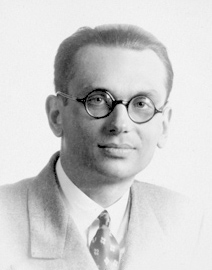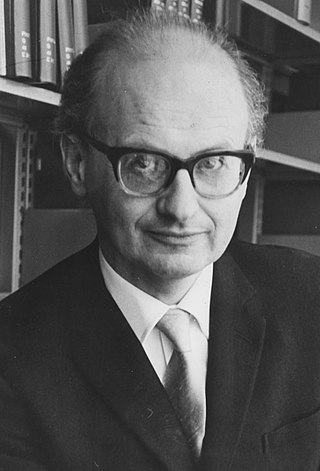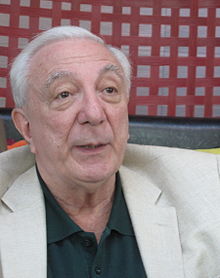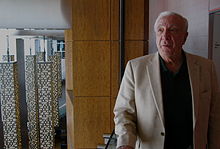Complexity characterises the behaviour of a system or model whose components interact in multiple ways and follow local rules, leading to non-linearity, randomness, collective dynamics, hierarchy, and emergence.

Kurt Friedrich Gödel was a logician, mathematician, and philosopher. Considered along with Aristotle and Gottlob Frege to be one of the most significant logicians in history, Gödel profoundly influenced scientific and philosophical thinking in the 20th century, building on earlier work by Frege, Richard Dedekind, and Georg Cantor.
Logical positivism, later called logical empiricism, and both of which together are also known as neopositivism, is a movement whose central thesis is the verification principle. This theory of knowledge asserts that only statements verifiable through direct observation or logical proof are meaningful in terms of conveying truth value, information or factual content. Starting in the late 1920s, groups of philosophers, scientists, and mathematicians formed the Berlin Circle and the Vienna Circle, which, in these two cities, would propound the ideas of logical positivism.

Physics is the natural science of matter, involving the study of matter, its fundamental constituents, its motion and behavior through space and time, and the related entities of energy and force. Physics is one of the most fundamental scientific disciplines, with its main goal being to understand how the universe behaves. A scientist who specializes in the field of physics is called a physicist.
The scientific method is an empirical method for acquiring knowledge that has characterized the development of science since at least the 17th century. The scientific method involves careful observation coupled with rigorous scepticism, because cognitive assumptions can distort the interpretation of the observation. Scientific inquiry includes creating a hypothesis through inductive reasoning, testing it through experiments and statistical analysis, and adjusting or discarding the hypothesis based on the results.

Imre Lakatos was a Hungarian philosopher of mathematics and science, known for his thesis of the fallibility of mathematics and its "methodology of proofs and refutations" in its pre-axiomatic stages of development, and also for introducing the concept of the "research programme" in his methodology of scientific research programmes.

Reductionism is any of several related philosophical ideas regarding the associations between phenomena which can be described in terms of other simpler or more fundamental phenomena. It is also described as an intellectual and philosophical position that interprets a complex system as the sum of its parts.

Stephen Wolfram is a British-American computer scientist, physicist, and businessman. He is known for his work in computer algebra, and theoretical physics. In 2012, he was named a fellow of the American Mathematical Society.

A New Kind of Science is a book by Stephen Wolfram, published by his company Wolfram Research under the imprint Wolfram Media in 2002. It contains an empirical and systematic study of computational systems such as cellular automata. Wolfram calls these systems simple programs and argues that the scientific philosophy and methods appropriate for the study of simple programs are relevant to other fields of science.
Foundations of mathematics is the logical and mathematical framework that allows developing mathematics without generating self-contradictory theories, and, in particular, to have reliable concepts of theorems, proofs, algorithms, etc. This may also include the philosophical study of the relation of this framework with the reality.

Anatol Borisovich Rapoport was an American mathematical psychologist. He contributed to general systems theory, to mathematical biology and to the mathematical modeling of social interaction and stochastic models of contagion.
David Berlinski is an American mathematician who has written books about mathematics and the history of science as well as fiction. An opponent of evolution, he is a senior fellow of the Discovery Institute's Center for Science and Culture, an organization which promotes the pseudoscience of intelligent design. Berlinski professes to be a skeptic about evolution, but he disavows belief in intelligent design.

The International Institute for Applied Systems Analysis (IIASA) is an independent International research institute located in Laxenburg, near Vienna in Austria, founded as an East-West scientific cooperation initiative during the Cold War. Through its research programs and initiatives, the institute conducts policy-oriented interdisciplinary research into issues too large or complex to be solved by a single country or academic discipline. These include climate change, energy security, population aging, and sustainable development. The results of IIASA research and the expertise of its researchers are made available to policymakers worldwide to help them make informed and evidence-based policies.
The term conceptual model refers to any model that is formed after a conceptualization or generalization process. Conceptual models are often abstractions of things in the real world, whether physical or social. Semantic studies are relevant to various stages of concept formation. Semantics is fundamentally a study of concepts, the meaning that thinking beings give to various elements of their experience.
James Grier Miller was an American biologist, a pioneer of systems science and academic administrator, who originated the modern use of the term "behavioral science", founded and directed the multi-disciplinary Mental Health Research Institute at the University of Michigan, and originated the living systems theory.
A metatheory or meta-theory is a theory on a subject matter that is a theory in itself. Analyses or descriptions of an existing theory would be considered meta-theories. If the subject matter of a theoretical statement consists of one or multiple theories, it would also be called a meta-theory. For mathematics and mathematical logic, a metatheory is a mathematical theory about another mathematical theory. Meta-theoretical investigations are part of the philosophy of science. The topic of metascience is an attempt to use scientific knowledge to improve the practice of science itself.

Karl Sigmund is a Professor of Mathematics at the University of Vienna and one of the pioneers of evolutionary game theory.

Computational mathematics is the study of the interaction between mathematics and calculations done by a computer.

Arturo Carsetti is an Italian Philosopher of sciences and former Professor of philosophy of science at the University of Bari and the University of Rome Tor Vergata. He is the editor of the Italian Journal for the philosophy of science La Nuova Critica founded in 1957 by Valerio Tonini. He is notable for his contributions, also as a member of the European Academy of Sciences and Arts, to philosophy of science, epistemology, metabiology, cognitive science, semantics and philosophy of mind.
The Complexity Science Hub Vienna (CSH) is a Vienna-based research organisation with the aim to bundle, coordinate and advance the research of complex systems, system analysis and big data science in Austria.











